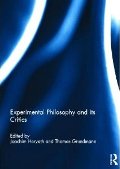|
Experimental Philosophy and its Critics
|
|
Edited by Joachim Horvath and Thomas Grundmann
|

|

Experimental philosophy is one of the most recent and controversial developments in philosophy. Its basic idea is rather simple: to test philosophical thought experiments and philosophers’ intuitions about them with scientific methods, mostly taken from psychology and the social sciences. The ensuing experimental results, such as the cultural relativity of certain philosophical intuitions, has engaged - and at times infuriated - many more traditionally minded "armchair" philosophers since then. In this volume, the metaphilosophical reflection on experimental philosophy is brought yet another step forward by engaging some of its most renowned proponents and critics in a lively and controversial debate. In addition to that, the volume also contains original experimental research on personal identity and philosophical temperament, as well as state-of-the-art essays on central metaphilosophical issues, like thought experiments, the nature of intuitions, or the status of philosophical expertise.
This book was originally published as a special issue of Philosophical Psychology.
Joachim Horvath is Post-Doctoral Researcher at the University of Cologne, Germany. He has mainly published in epistemology and metaphilosophy. His current research is on conceptual analysis, experimental philosophy, thought experiments and the theory of epistemic justification.
Thomas Grundmann is Professor of Philosophy at the University of Cologne, Germany. He has published widely in epistemology and the philosophy of mind. In his current research he is mainly working on a priori knowledge, metaphilosophy, metaepistemology, scepticism and social epistemology.
|
|
